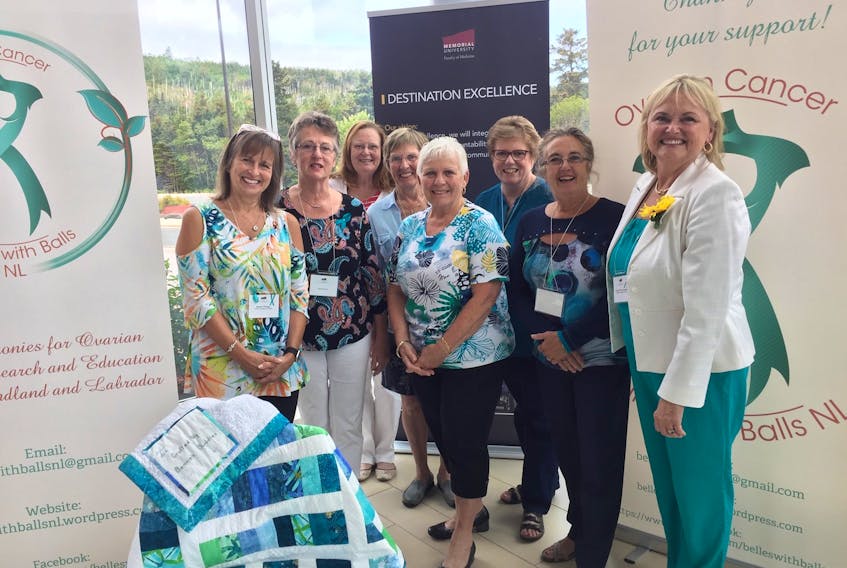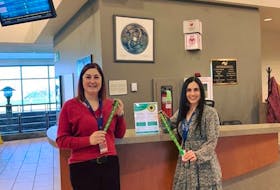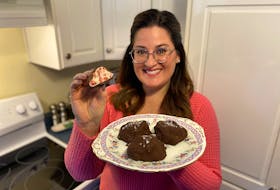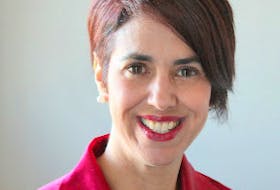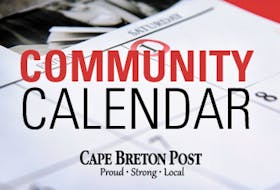In 2010, Bonnie Morgan began to feel off. Because of her age, the 54-year-old chalked the bloated feeling up to menopause. But it persisted long enough that she made an appointment with her family physician, Dr. Heather Woodland in St. John’s, NL.
After examining Morgan, Dr. Woodland thought she felt a cyst. Morgan was sent to get an internal ultrasound and a blood test.
That test identified elevated levels of a protein in Morgan’s blood called cancer antigen 125 (CA 125). By itself, elevated levels aren’t an indicator of cancer. Dr. Woodland ordered more tests.
When the results came, Morgan’s then-boyfriend Charlie (now her husband), drove her to her appointment. She went in alone, confident her doctor would tell her it was a false alarm. After all, she had no family history of cancer. She didn’t smoke. She ate well, she exercised. Aside from the bloating, she hadn’t experienced any symptoms.
“When I went in and she told me that I had ovarian cancer, and they didn’t know what stage it was, I was in the room by myself because I was so confident it was just a cyst,” recalls Morgan of the conversation with her doctor.
“So, I was there by myself. And I just said to her, ‘Am I going to die?’ And she said, ‘Bonnie, we don’t know the stage and I can’t really say anything. I can’t tell you.’”
World turned upside down
The five-year survival rate for ovarian cancer is 40 per cent. Her partner had dropped her off in one version of her life and returned to pick her up in another.
“I opened the door at the doctor’s office, and I said, “Charlie, I have cancer.” and he said, ‘There’s no way Bonnie.’ I said, ‘yes I do.’”
“I don’t really remember a lot from that moment. We just went out in the car and sat in the car and just kind of got our heads together a little. My parents, at that time, were in their early 80s. They’re now 89 and 92. But I had to go tell them, then. I think that was one of my biggest fears was to have to tell Mom and Dad that I had cancer. And from there it was just like a roller coaster ride.”
Doctors at the Dr. H. Bliss Murphy Cancer Centre in St. John’s determined that Morgan would need surgery. In addition to the usual risks, her gynecologic-oncologist Dr. Lesa Dawson let Morgan know that the outcome of the first operation depended on what they found in her body.
“If she wasn’t able to remove it, she would have to close me up and we’d do chemotherapy treatments first and then she’d go back in again,” says Morgan. “But after a couple of hours of surgery, she came out and told my family that she was going to proceed with the surgery.”
Dawson removed the tumour and cancerous tissues. Morgan woke up to another unwelcome surprise.
“It had jeopardized my bowel, so I ended up with a temporary colostomy, which again was another shock when I woke up,” she says. “After that, I had to do 18 treatments of chemotherapy. I lost my hair. Went through all of the normal things with chemotherapy. And a year later, they were able to reverse the colostomy, which was a great thing.”
Round two, three, and four
For four years Morgan was cancer-free. Dr. Dawson moved into genetics research, and so Dr. Patti Power became her gynecologic oncologist.
In 2014, almost to the day of her original diagnosis, doctors found another spot. She went through another round of chemo.
Three years later, she had a cancerous spot surgically removed by Dr. Power, and more chemo.
In 2019, doctors found another spot. This time, the cancer had spread to her gallbladder, liver and bowel. In June 2019, another surgeon, Dr. Steven Quigley, removed her gallbladder, 20 per cent of her liver, a foot of her bowel and the remainder of her omentum, the structure that helps store fat and contributes to immune response. By December 2019, Morgan finished her most recent chemotherapy regimen.
Since then, she’s been on a breakthrough ovarian cancer treatment, the pharmacological inhibitor for PARP (the enzyme poly ADP ribose polymerase) called Imparsa, which represents the first major advance in the treatment of ovarian cancer in half a century. The drug has some side effects, but thus far it has worked for Morgan.
“I think first when I was diagnosed and got through the four years, I felt kind of maybe it may be gone. But I think once it came back once, that first recurrence, since then my life… Well, my life has totally changed anyway, because you're never the same after a diagnosis of cancer. But it’s with me every day.”
Morgan is monitored very closely to see how she continues to respond to the PARP inhibitor. Each month she relives the experience of that doctor’s appointment in 2010, this time with the knowledge that good news is not guaranteed.
“Every time I have to have a CAT scan or a PET scan or a blood test, ramping up to that, the week or so before that, I'm anxious,” she says. “Until I hear the results, I'm anxious.”
A working retirement
After her initial occurrence of ovarian cancer in 2014, Morgan tried to return to her old job at East Coast Catering.
“I went back for a while and I couldn’t. The fatigue and not being able to concentrate, I couldn’t stay at work, so I had to retire.”
A lifelong working person who had spent 20 years as the general manager’s assistant before joining East Coast Catering, Morgan wasn’t able to sit still. Before her diagnosis, she had never heard of ovarian cancer, much less been able to identify the symptoms she was experiencing. After everything she’d been through in 2014, Morgan was determined to help others avoid walking blindly into the same diagnosis.
“It’s not a really well-known cancer, and there’s no effective screening test for ovarian cancer. A lot of women are under the impression that your yearly PAP test detects ovarian cancer, but it doesn't,” she says. “It’s usually diagnosed at an advanced stage because it’s not picked up.”
Morgan, Charlie and Dr. Dawson laid plans for what is now the Ovarian Cancer Research and
Education Fund (OCRE) at Memorial University. An old friend, Alana Walsh-Giovannini, whose mother died of ovarian cancer in 2001, came on board to co-chair the fund with Morgan. The OCRE fund is focused primarily on research identifying the genetic markers that predispose individuals to ovarian cancer. OCRE has already contributed to one major breakthrough, the discovery of a gene, RAD51C, that may prove useful in screening tests to determine cancer risk.
“Because of the demographics in Newfoundland, they have the ability to track families back through the years [through] grandmothers, great-grandmothers.”
In 2017, OCRE began hosting one-day annual education seminars, which they call Exposiums. The following year marked the launch of their fundraising arm, Belles With Balls, which features Morgan and Walsh-Giovanni as volunteer co-chairs along with committee members Margie Coombes, Paula Giovannini, Kaitlyn Jarvis, Barbi King, Michele Peach, Tara Power, Janice Ryan, Hayley Wilson, Bonnie Fox, Eileen Woodford and Megan Morgan.
A difficult telling
As part of these efforts, Morgan has been sharing her story, knowing the impact her personal experience can have.
“For me, it was not easy to talk about, and it still isn’t. But I was familiar with it. When I started talking about my story, I thought I was talking about someone else. That sounds kind of strange, too, I know, but I did. I felt like I was talking about someone else,” says Morgan.
“I find that any time I tell the stories or talk about it that someone there in that group either knows someone who had ovarian cancer or wants to go get tested because they’ve had some of the symptoms that we talked about.”
So far, the OCREF has raised more than $200,000.
“Even though I started this initiative, I can’t take all the credit for the promotion and success of it, because I have to thank Alanna, my co-chair, and the other ten Belles who volunteer.”
Strength in action
Taking action has helped Morgan to restore a sense of agency in her life.
“I feel like I made a difference, even if it’s only a small one, and I think that helps me kind of get through. I never really felt like I was a victim and I never really felt sorry for myself and I never said ‘why me?’ I guess I had to get past it,” she says. “People say they never thought I was as strong as I am, but i didn’t realize that I was strong, getting through this, because I just put my head down, just did what the doctors told me to do.
“I’ve never really referred to myself as a survivor. I'm not sure why, but I think it’s because I don’t like to say that I survived and someone else didn’t.”
Morgan is clear about the fact that ovarian cancer has changed her life. She’s candid about the fact that every recurrence has been its own battle in a larger war. Life doesn’t neatly separate the mundane and the dramatic. They swirl together. Morgan, now living in Portugal Cove-St. Philip’s, has had to become skilled at mixing her twin realities: one where she is alive and happy and another where the threat of renewed disease is ever present.
“I got married in 2016, between different diagnoses and recurrences. Life is basically as normal as it can be. I do most things that I did before. There’s some things I'm limited to because of this medication and with the treatments I've been through.
“Sometimes I lose my words. My memory is not what it used to be. I go to say something, and I can’t come up with the word. I have fatigue every day, later in the evening because of either past chemo I guess or because of the medications.
“But I drive, I shop. I go out with my friends as much as I can, and my family. Parts of it are… It’s probably 20-80. Twenty is probably things that I can’t do anymore and 80 is probably what I try to do. I was taking art lessons when I was first diagnosed, and I got back to it in between.”
September is Ovarian Cancer Awareness month. Morgan wants others to be alert to the risks, because she knows firsthand the reality behind the slogans and the fundraisers.
“Bloating, change in your bowel habits, fatigue, pelvic discomfort, nausea, ovarian cancer symptoms very much mimic menopause or irritable bowel syndrome. And sometimes people just pass it off for that. But I think if it’s there for any length of time, I would ask people to go get it checked. That would be my message.”
Anyone looking for more information, or who would like to donate or get involved, can visit the Belles With Balls Facebook page or https://belleswithballsnl.com/.

